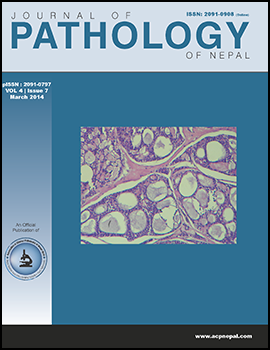A study on microvascular density in breast carcinoma
DOI:
https://doi.org/10.3126/jpn.v4i7.10315Keywords:
Breast cancer, Angiogenesis, Microvascular DensityAbstract
Background: Breast Cancer is the most frequent neoplasm causing death in women between 35-55 years of age. Of the Prognostic indicators existing for breast cancer, axillary lymph node status has been regarded as the most important one. Twenty to thirty percent of all lymph node negative patients will still develop a recurrence of the disease within 10 years of initial treatment. Therefore, a new prognostic marker that could identify patients at high risk of tumor recurrence more accurately than existing indicators would be of great value, one potential indicator is tumor-induced angiogenesis.
Materials and Methods: This is a six months prospective (January 2010-June 2010) and 1 year retrospective (Jan2009-Dec2009) study which included thirty five breast cancer cases visiting the Surgical OPD. Angiogenesis was estimated by determining micro vessel counting after immune staining the paraffin embedded tissue sections using anti-CD34 antibody.
Results: Age of the patients ranged from 25 to 80 years with a mean age of 45.48 years. Most of the cases were infiltrating ductal carcinoma comprising of 33 cases (94.28%). Three cases (9.10%) showed vascular invasion by the tumor. Majority showed (63.64%) vessel count of less than 200 per 10 high power fields.
Conclusion: Micro vascular density positively correlated with size of the tumor, lymph nodes involved by the tumor and Nottingham prognostic index. In the future, Antibodies specific to proliferating endothelium, together with the development of automated image analysis, may improve the accuracy and value of measuring angiogenesis-induced microvessel density.
DOI: http://dx.doi.org/10.3126/jpn.v4i7.10315
Journal of Pathology of Nepal (2014) Vol. 4, 570-575
Downloads
Downloads
Published
How to Cite
Issue
Section
License
This license enables reusers to distribute, remix, adapt, and build upon the material in any medium or format, so long as attribution is given to the creator. The license allows for commercial use.




